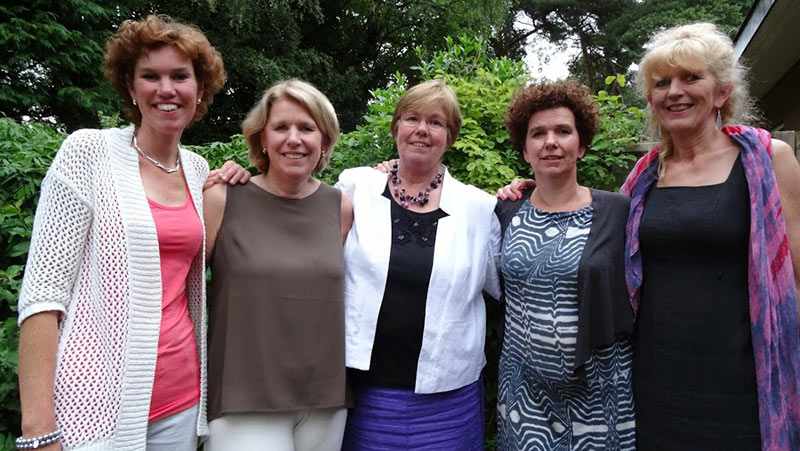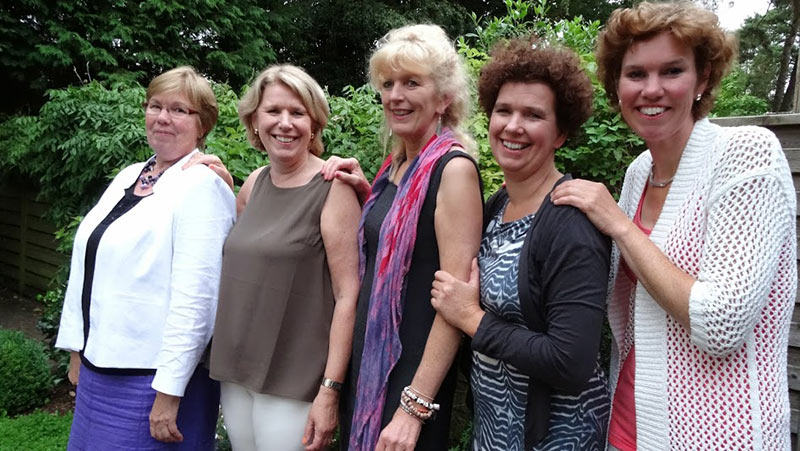Family
On a map of the Netherlands, in a rural area situated East of Rotterdam, in the neighborhood of the world heritage site of the windmills of Kinderdijk, on the border of a river, you can find Oud-Alblas. I was born the eldest daughter of five girls and enjoyed the advantages of rural life, swimming and canoeing in the summer, and skating in the winter. I went to school in the village, and later in a nearby town by bike. Biking and skating are still my favorite sports.
Life was peaceful, but started to change when my father had to look for another profession due to health reasons. He received training in Amsterdam for two years, to become a surveyor and real estate agent, one of the few to pass the exam although his entry requirements barely met the standard. His own business started with my mom as his “office manager.” As we grew up at times, we, as children had to perform our chores and on Saturdays help run the business, added to the homework for school.. There was no free time except for Sundays, and the coffee times around the kitchen table with whoever happened to be there. Comments like this were often heard: “don’t complain but continue,” “just be strong, and take the cow at the horns,” “come on let’s get this show on the road,” “where there’s a will, there is a way” and “cannot exists not.”
This spirit was present in my maternal grandparents. They played an active role in the resistance movement during World War II, hiding Jews in their house. The Christian heritage, from both of my grandpas, is very precious and significant to me. Psalm 42 was Opa Van den Berg, my mom’s father’s favorite psalm and he often sang the fifth strophe of the Genevan Psalms: “But the LORD will send salvation, and by day His love provides. He shall be my exultation, and my song at eventide.” He lived out the promise that the Lord always provides a way out. Opa Kool reminded me, on his deathbed, of the hymn: “Ga nietalleen door het leven, die last is u te zwaar, laatÉen u sterktegeven, ga tot uwmiddelaar,” which means, “Do not live your life on your own, but let one give you strength and be your Savior. Their solid faith in Christ, lived out in everyday life, showed me the reality of God’s presence and providence.



New avenues of faith
Our church was an active part of life in our family and our mainly Christian village. We were required every Monday morning to learn and recite a verse from the Genevan Psalter. It was a must then, and a great treasure today. Mine is true psalm spirituality, inherited also from the Reformed Church in which I grew up. They have sung only psalms and no hymns to this day. As a teenager I became curious and hungry for more of the Christian faith. I discovered it in a so-called Coffee Bar ministry, an evangelistic, interdenominational outreach in the town where I attended high school. On Saturday evenings we sat cramped with 150 or more in a refurbished attic of a house near a dike. We sang, prayed, and attended Bible studies with fellowship, fun, love and acceptance for just as who we were in Christ. The talks were given in a language for us as young people, different from the “Canaan language” in the church services I used to attend.
Many of our hearts were touched to become leaders in local churches and mission organizations all over the country and beyond. One missionary from the Philippines spoke to some of us who engaged her in a profound discussion on her life. Quoting Psalms 18: 29, “With your help I can advance against a troop, with my God I can scale a wall,” she asked what we would need for this verse to become true. We tried to guess, but then she answered: “a wall!”
I never forgot this, as many walls have come into my life since, and the truth of being able to scale a wall with God’s help came true. It was a revival time, where the Bible knowledge, we acquired in our Calvinistic churches, was ignited with the fire of the Spirit. My world started to open up. Sharing our newly discovered faith with others became as natural as breathing and eating with responsibility for outreach to nearby Belgium. I became a co-worker with a variety of tasks including inviting visitors for discussions on being a Christian, and how to be an instrument of transformation in modern society. Even today, I meet old friends who have similar spiritual roots.
(This is a section of a chapter on my pilgrimage in mission:. “Behind the Former Iron Curtain: Teaching Missiology in Central and Eastern Europe.” In Wild: Women in Leadership Development, edited by Gwen Dewey Grace Barnes. Woodinville, WA: Harmon Press, 2013.)